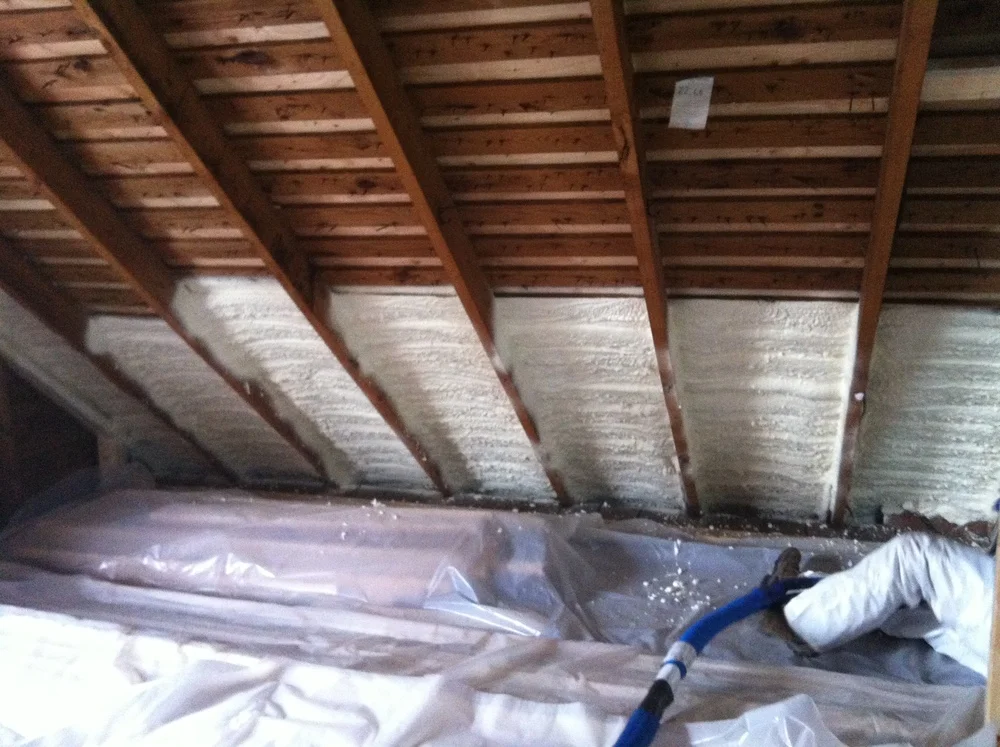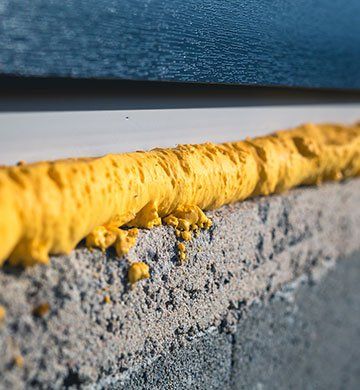Choosing the Right Sort Of Spray Foam for Your Insulation Requirements
Choosing the Right Sort Of Spray Foam for Your Insulation Requirements
Blog Article
Spray Foam: The Ultimate Service for Air Sealing and Insulation
Spray foam insulation has become a leading option for effective air securing and thermal insulation, providing an one-of-a-kind combination of homes that establish it apart from conventional methods. Its ability to increase and fill voids makes it specifically effective in avoiding air leak, which can considerably influence power effectiveness. Recognizing the full scope of its advantages, installation procedures, and comparisons with other insulation kinds is critical for making informed choices. As we explore these facets, the ramifications for both brand-new building and constructions and retrofits come to be significantly considerable. What factors should affect your choice?
What Is Spray Foam?
Spray foam is a functional insulation material that incorporates the principles of air sealing and thermal resistance to enhance energy efficiency in buildings. Made up mainly of polyurethane or various other comparable compounds, spray foam is applied as a liquid that broadens upon call with surfaces, developing a strong, continuous layer of insulation. This one-of-a-kind building allows it to fill spaces, fractures, and spaces that typical insulation materials may ignore, supplying an exceptional air seal.
There are two primary kinds of spray foam: open-cell and closed-cell. Open-cell spray foam is lighter and more versatile, supplying excellent noise absorption and a lower R-value per inch - Spray Foam. In comparison, closed-cell spray foam is denser, providing a higher R-value, wetness resistance, and added architectural honesty to constructing elements
The application process typically entails customized equipment, making sure a seamless application that abides by different substratums, including steel, wood, and concrete. This flexibility makes spray foam ideal for both new building and constructions and retrofitting existing frameworks. Its capability to produce an impermeable obstacle substantially adds to reducing energy intake and improving interior air high quality, thereby making it a recommended choice amongst home owners and building contractors alike.
Advantages of Spray Foam Insulation
Among one of the most significant advantages of spray foam insulation is its phenomenal ability to produce a continual air barrier, which effectively minimizes power loss. Unlike typical insulation materials, spray foam increases to load voids and fractures, making certain that air leak is significantly minimized. This particular not only enhances power performance but likewise results in decrease energy costs in time.
Furthermore, spray foam insulation provides premium thermal resistance, contributing to an extra stable interior setting. Its high R-value per inch allows for efficient insulation in confined areas, making it excellent for attic rooms, walls, and crawl areas. Moreover, the moisture-resistant buildings of spray foam aid stop mold and mildew development, advertising healthier living problems.
An additional critical benefit of spray foam insulation is its sound-dampening top qualities (Spray Foam). It effectively decreases noise transmission in between rooms, producing a quieter and much more comfy home setting. The sturdiness of spray foam also stands apart, as it does not droop or clear up over time, maintaining its efficiency throughout its lifespan
Just How Spray Foam Works
Recognizing just how spray foam insulation functions is necessary for appreciating its performance in air sealing and thermal resistance. Spray foam insulation includes 2 main parts: isocyanate and polyol resin. When these components are mixed, they undergo a chemical reaction that creates the product to broaden swiftly, producing a dense foam that fills fractures, dental caries, and spaces.
As the foam increases, it complies with surfaces, creating an airtight seal that significantly decreases air seepage. This particular makes spray foam insulation extremely efficient at protecting against drafts and dampness penetration, which can cause energy loss and damage in time. Furthermore, the closed-cell version of spray foam provides superior thermal resistance as a result of its inflexible structure, effectively minimizing heat transfer.
The distinct residential properties of spray foam enable it to comply with uneven surfaces, guaranteeing comprehensive protection and a seamless obstacle. Because of this, spray foam insulation not only boosts energy efficiency yet additionally contributes to improved interior air quality by decreasing the accumulation of irritants and pollutants. Eventually, comprehending the mechanics behind spray foam emphasizes its duty as a remarkable option for insulation and air discover this info here sealing in both industrial and household applications.
Installation Process Introduction

Prior to installment, the room must be appropriately cleaned and prepped, making sure that surfaces are devoid of dirt, wetness, and particles. Because impurities can endanger attachment and general efficiency, this action is crucial. When the location is prepared, the application includes blending the 2 elements of the spray foam, which expands upon call and loads spaces efficiently.
Trained experts need to carry out the setup, making use of specific tools to make sure consistent insurance coverage and optimum thickness. Security preventative measures, including wearing safety gear and ensuring proper air flow, are vital throughout this process. After application, the foam normally remedies rapidly, developing a strong barrier that enhances power performance.
Comparing Spray Foam to Traditional Insulation
When examining insulation choices, spray foam insulation attracts attention in comparison to standard materials such as fiberglass and cellulose. Among the key advantages of spray foam is its superior air sealing abilities. Unlike fiberglass and cellulose, which link can allow air seepage, spray foam increases upon application, filling voids and gaps to develop a closed seal. This causes improved power effectiveness, as less heated or cooled down air runs away the home, causing reduced energy expenses.
In addition, spray foam supplies a greater R-value per inch than standard insulation kinds, using more effective thermal resistance in a thinner account. This characteristic is especially beneficial in areas with limited dental caries depth. Additionally, spray foam is resistant to wetness and mold development, which navigate to these guys can be a significant worry with cellulose and fiberglass, specifically in humid atmospheres.
However, spray foam insulation generally lugs a higher in advance price than its typical equivalents. House owners must evaluate this initial investment versus long-lasting energy savings and efficiency benefits. Ultimately, while both insulation types serve their purpose, spray foam arises as an extra sophisticated remedy for modern insulation needs, particularly in regards to air securing and thermal effectiveness.

Final Thought
In recap, spray foam insulation represents an extremely efficient service for accomplishing optimum air sealing and thermal resistance. Its special properties, consisting of dampness resistance and sound dampening, make it suitable for numerous applications in both new constructions and retrofitting projects (Spray Foam). Although the preliminary costs may be higher contrasted to conventional insulation products, the long-lasting advantages, such as significant power cost savings and improved interior air top quality, validate the investment and highlight its worth in modern building techniques.
Spray foam insulation has actually emerged as a leading option for reliable air securing and thermal insulation, using a distinct combination of buildings that set it apart from traditional approaches.Spray foam is a versatile insulation material that combines the concepts of air sealing and thermal resistance to enhance energy efficiency in buildings.When evaluating insulation choices, spray foam insulation stands out in comparison to traditional materials such as fiberglass and cellulose. Inevitably, while both insulation types offer their purpose, spray foam arises as a more advanced service for modern-day insulation requirements, especially in terms of air securing and thermal efficiency.
In summary, spray foam insulation represents a highly effective solution for attaining optimal air securing and thermal resistance.
Report this page